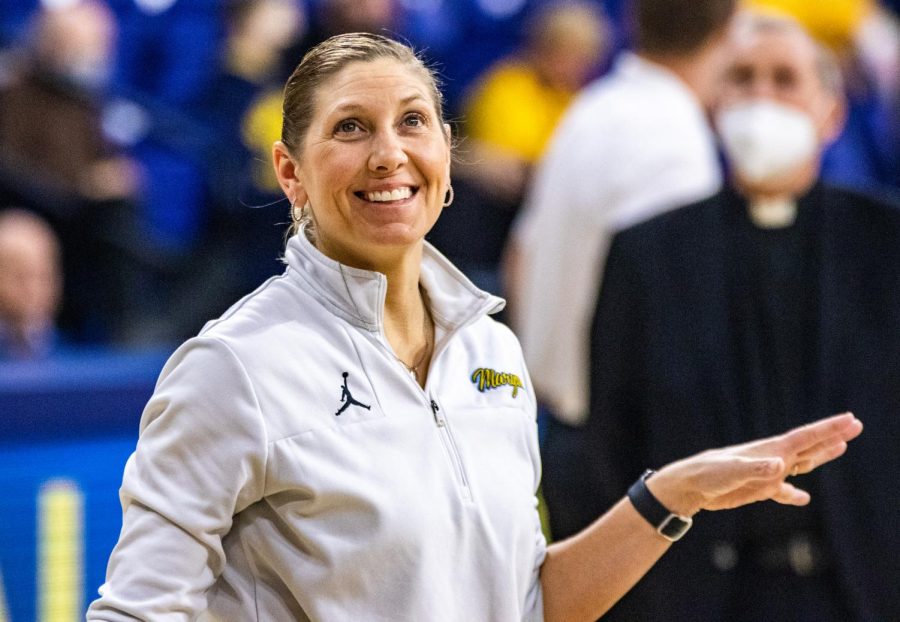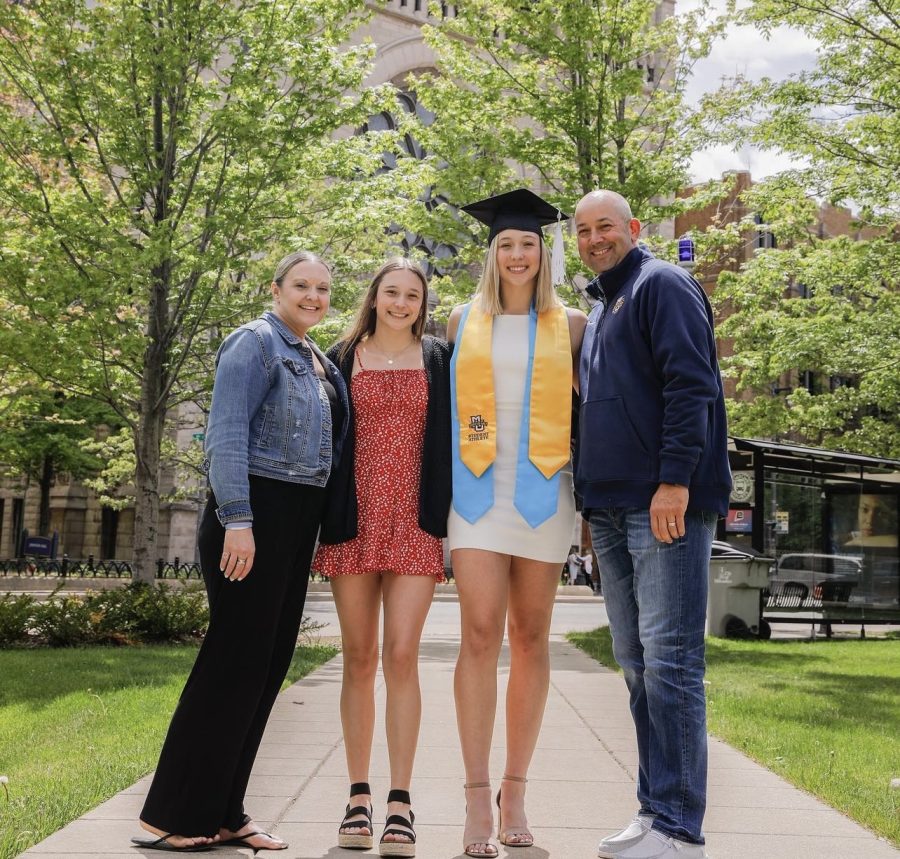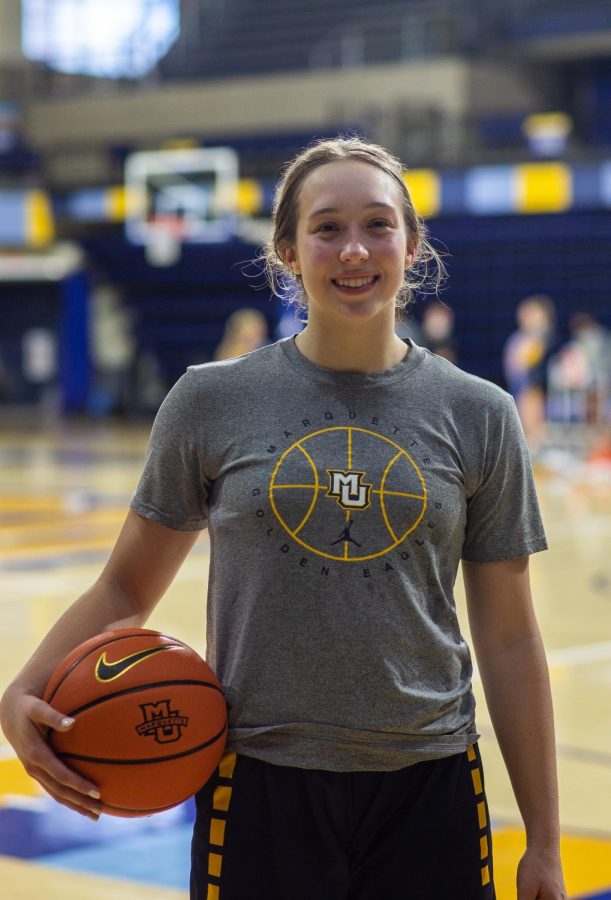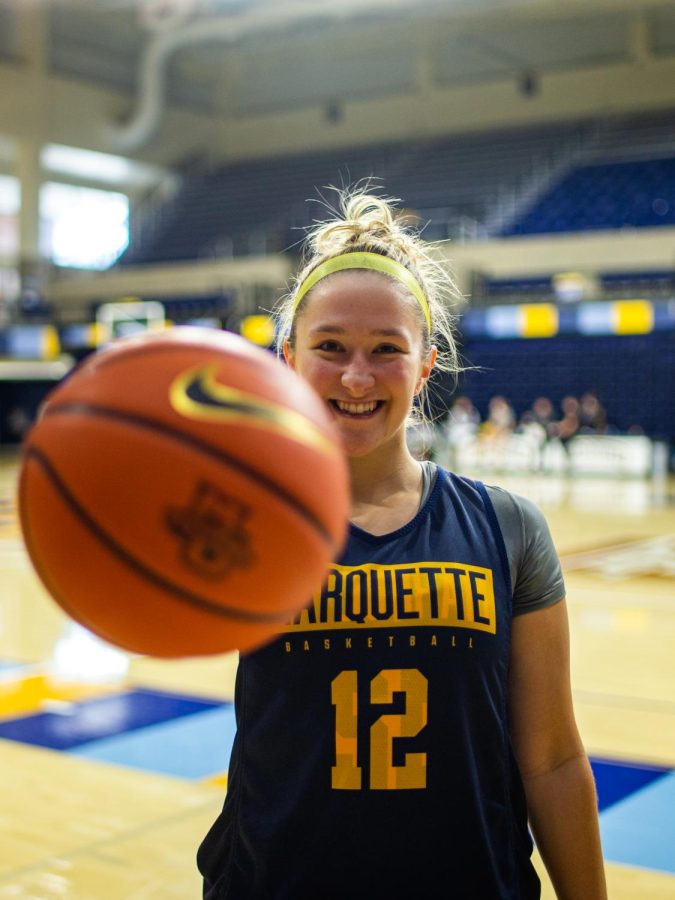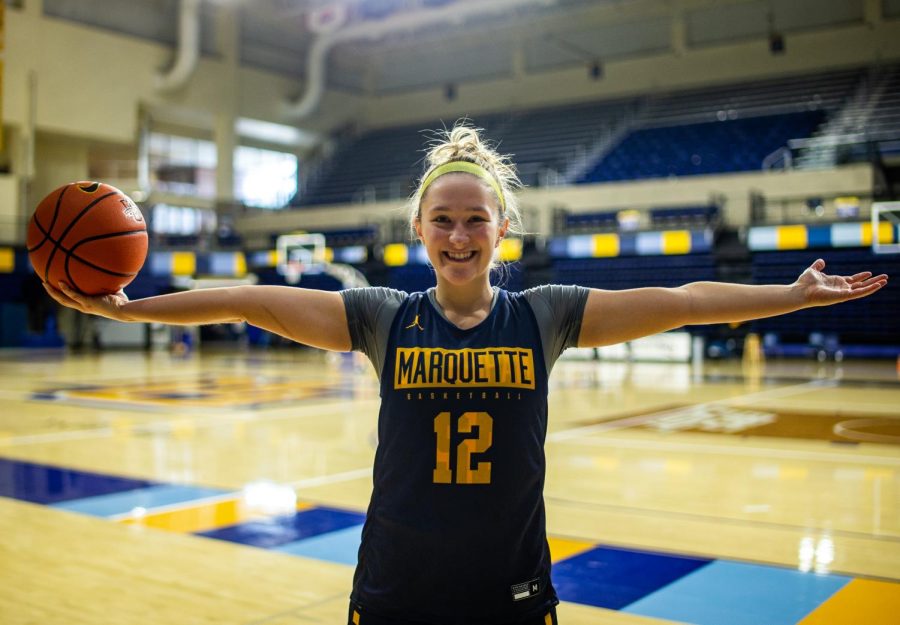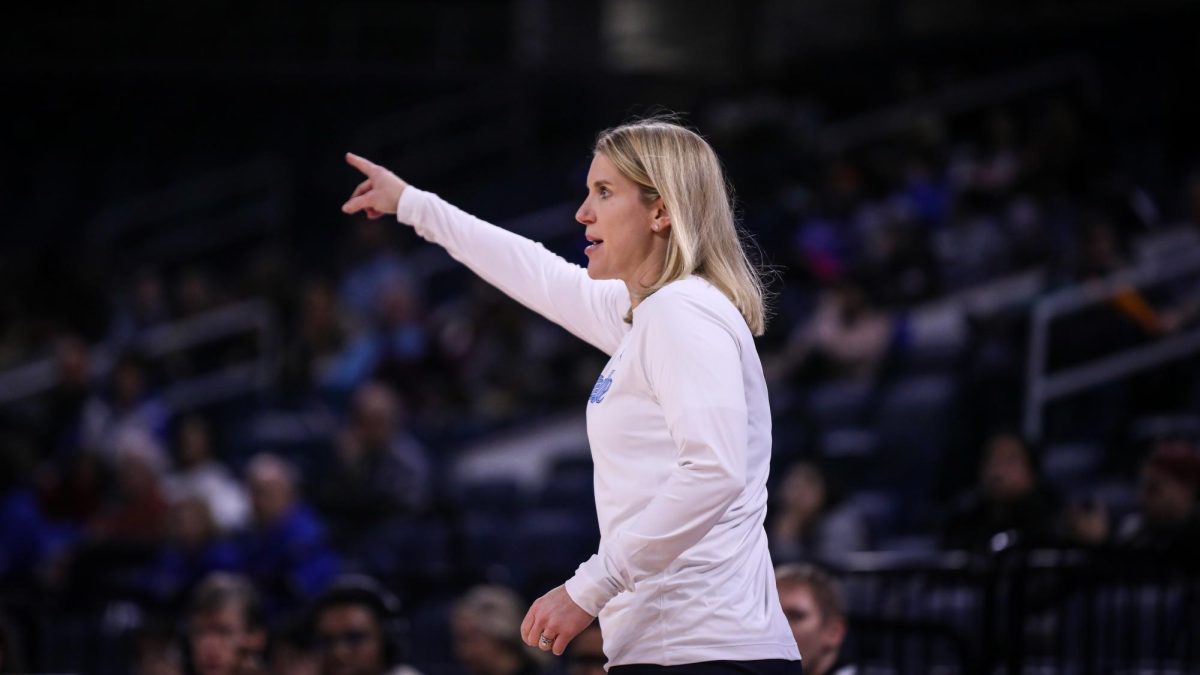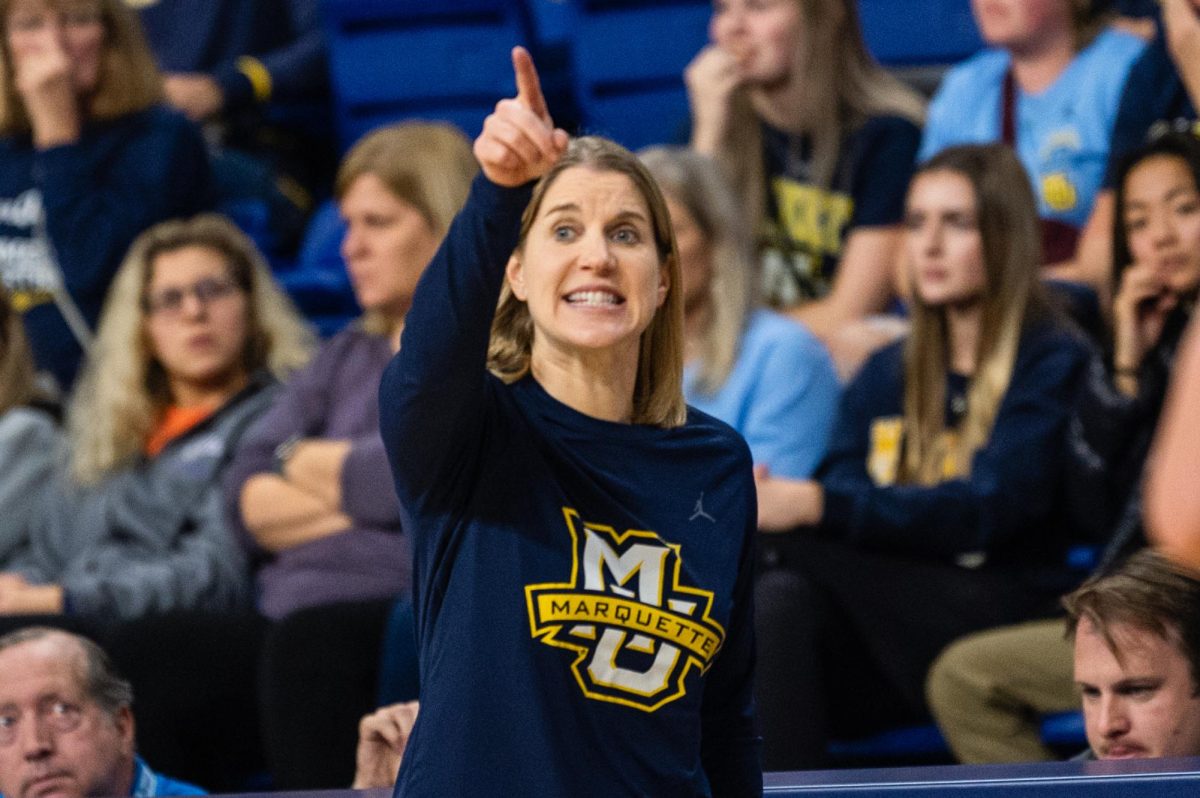Kelly Komara was picking up groceries with her dad, Bob, at the local supermarket in Schererville, Indiana. A tall man shopping with his own kids approached the Komaras.
“Hey coach Komara, what’s going on man? You won’t believe what an influence you’ve had on my life,” the man said to Komara’s dad. By now, Kelly was used to these encounters — after all, Bob was a high school football coach.
At the age of seven, Kelly Komara had discovered her calling: becoming a coach.
Komara recalled, “As a young person, seeing these guys come up to your dad is like, ‘this is so cool,’ and I knew from that point on I wanted to have that influence.”
Following her family tradition, Komara — who just finished up her first season as an assistant women’s basketball coach at Marquette — became a coach, and her specialty is hoops.
Although Komara’s speciality is hoops, her athletic career began on rubber mats and balance beams.
“My mom owns a gymnastic school, (so) my first sort of introduction to sports was gymnastics,” Komara said.
When she was eight years old, Komara got introduced to basketball through a Biddy Ball League. Her all-girls league was coached by none other than her father.
“It became my passion from pretty much that point on,” Komara said.
It wasn’t success that made Komara stick with basketball, but rather a love of competing with teammates that gymnastics could not offer.
“Every year that I was in organized sports, that competitiveness and win-at-all-costs mentality grew,” Komara said. “I loved every minute of it.”
Staying close to home
During her sophomore year of high school, Komara tore her ACL, which was feared to be a career-ending injury at the time.
“A lot of people counted me out,” Komara said. “For a 15-year-old to have people doubt you, it kind of raises your awareness of self-confidence, and if you lose your self-confidence, it’s going to be hard to return from something like that.”
Komara said her injury modeled how she would go onto look at her life on and off the court.
“What I took from my injuries was you’re not guaranteed another moment, another practice, another game, so enjoy every second that you have,” Komara said.
Growing up in the 1990s, television networks didn’t cover college women’s basketball. ESPN only covered “the big games” or the Final Four at most.
“To have your family be able to watch you play, the only way you could do that was to stay local,” Komara said.
So for Komara, the decision came down to Notre Dame and Purdue University.
Ultimately, she committed to the Boilermakers, calling West Lafayette, Indiana her home for four years prior to her senior season of high school.
“I connected with that (Purdue) coaching staff and sort of felt that energy in that vibe from them,” Komara said. “I committed early and held to that through two coaching changes so loved every minute of it and was proud to play there.”
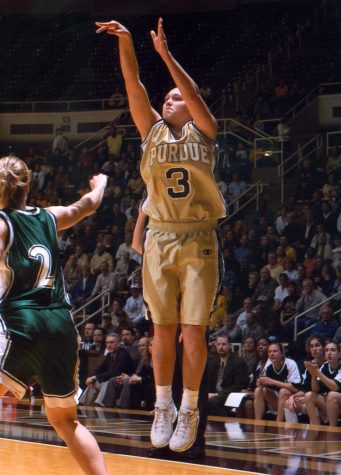
A standout guard at Lake Central High, Komara was named Indiana’s Miss Basketball after averaging 21.5 points per game as a senior.
Komara’s high school stats caught the eye of then-Boilermakers head coach Carolyn Peck.
“Kelly’s a fierce competitor. That was the thing that I loved about her watching her play,” Peck said. “She played from start to finish. She competed every second like she was playing for a national championship.”
Enter Komara’s first collegiate game against No. 1 ranked Tennessee. Inside Mackey Arena, the Boilermakers home arena, 11,788 fans — then the third-largest crowd for a women’s game in school history — packed in.
“I just remember thinking ‘I’m just happy to be here. This is great.’ I didn’t have any expectations of playing time,” Komara said.
Then Peck called Komara off the bench.
“I don’t think she had been in the game for seven seconds and the ball swings to her, she pulls it for a deep 3-pointer and knocks it in,” Peck said.
For Komara, that moment served as a metaphor for life.
“I’ve never had any hesitation with anything I’ve done because I’ve always felt prepared,” Komara said. “I’ve always put myself in a position to be confident in what I’m doing.”
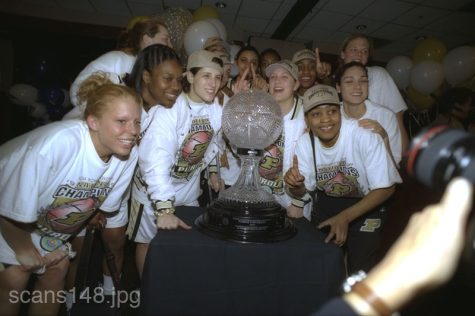
Komara became a key contributor for Purdue that season, helping them win the program’s first national championship.
“As a player, you don’t realize how hard that is,” Komara said. “You come in as a freshman you’re like, ‘whoa, this is awesome. We’re supposed to win every game.’ And then as you get older you realize how difficult that really is.”
Returning to that calling
During her senior day speech in 2002, Komara said, “I’ll be back one day. I don’t know how. I don’t know when. But I’ll be back.”
It wasn’t until 2014, after a brief professional playing career, that her promise saw fulfillment.
“You talk about full circle, it was a really special time,” Komara said. “Not just for me, but for my family to sort of be back in that environment again.”
Before she returned to work at her alma mater, Komara worked from the bottom, building her name and coaching philosophy.
“Especially for college women’s basketball coaches, it’s a very tough and demanding job,” Komara said. “You have to put in a lot of hours, work and be good at what you do or the next guy in line is gonna take your spot.”
During Komara’s two seasons at the University at Albany, she learned discipline. Purdue was her next location, before a stop at Vanderbilt University to join former teammate Stephanie White.
In five years at Vanderbilt, Komara proved herself as a specialist in guard play and development. In 2019, Komara oversaw the first Commodore duo to post more than 100 assists apiece in nearly a decade.
During her time in Nashville, Komara worked alongside Peck for two seasons. Peck said she saw Komara grow as a coach and leader firsthand.
This past offseason, Komara moved to the Midwest to join Marquette head coach Megan Duffy’s staff.
Komara said Duffy’s “energy” and “enthusiasm” for the program and university made it an easy choice to come to Milwaukee.
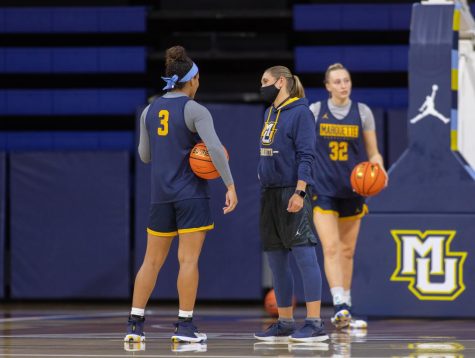
Marquette graduate student guard Karissa McLaughlin works primarily with Komara.
McLaughlin said Komara’s strength is making each point guard believe in themselves and bring out the toughness and grit that a point guard needs.
“Coach K has done a great job for us coming in seamlessly. She spends a lot of time with our point guards teaching the game, giving them confidence and understanding that they have a hard job every single day,” Duffy said. “She’s a great teacher.”
Family
Komara’s teaching doesn’t stop at the blow of a whistle.
Whether it’s looking up to Section 103 after a home game or walking into her house, Komara has a smile when she sees her two children, Kennedy and Hudson, and wife, Jen.
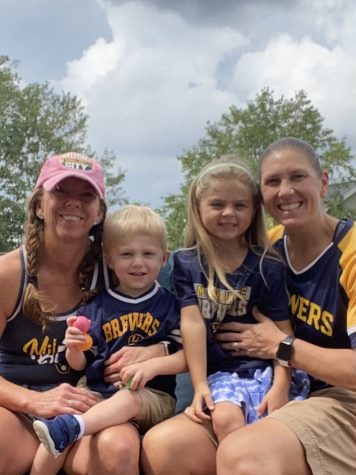
As a member of the LGBTQ community, Komara said one way she has tried to overcome struggles and impact the next generation of women’s basketball players has been through representation.
One of those examples is having her players get to know and see her family at games.
“If you treat it differently than anything else, it’ll look different,” Komara said. “But if you treat it as ‘this is my core unit of people around me,’ you don’t treat it any differently than you would anything else.”
Marquette hosted a Pride Night Jan. 26. For Komara, it served as a proud day to work for the program.
“Being part of the LBGTQ community, having a wife and two children, it was really important for me to really soak up that moment and see how far we have come so that we can have a Pride Night at a college basketball game,” Komara said.
At the end of the day, Komara said “love always wins in anything.”
“For me to live that every day and … be that role model for them, no matter what, be you, and that’s the best thing you can do,” Komara said.
This article was written by John Leuzzi. He can be reached at john.leuzzi@marquette.edu or on Twitter @JohnLeuzziMU.

